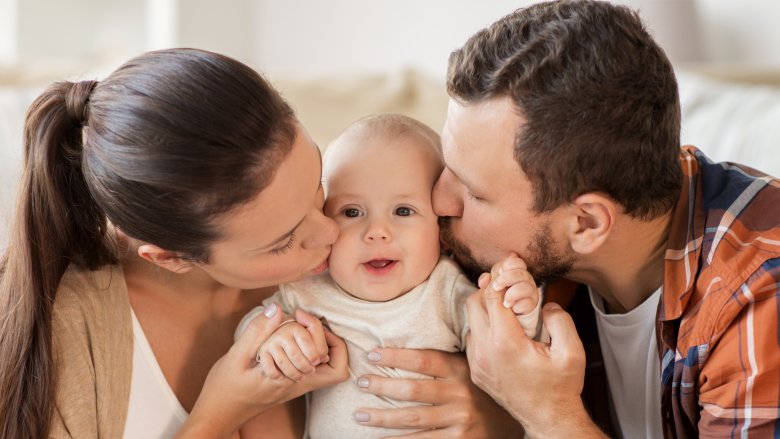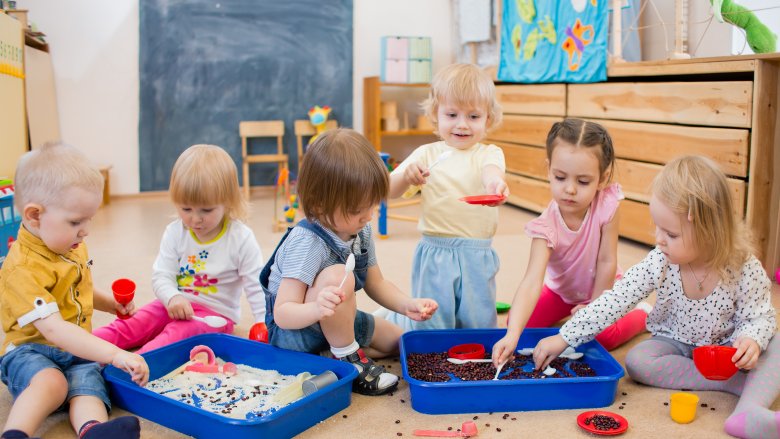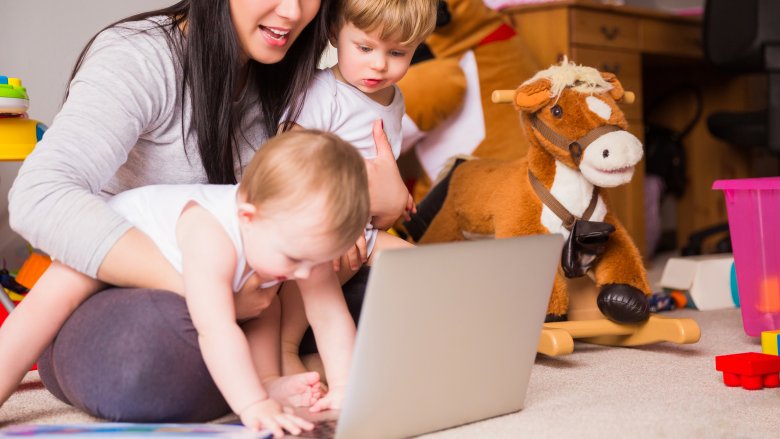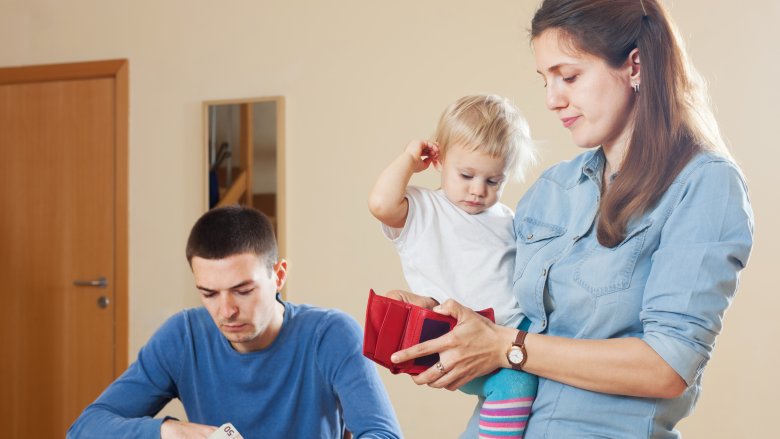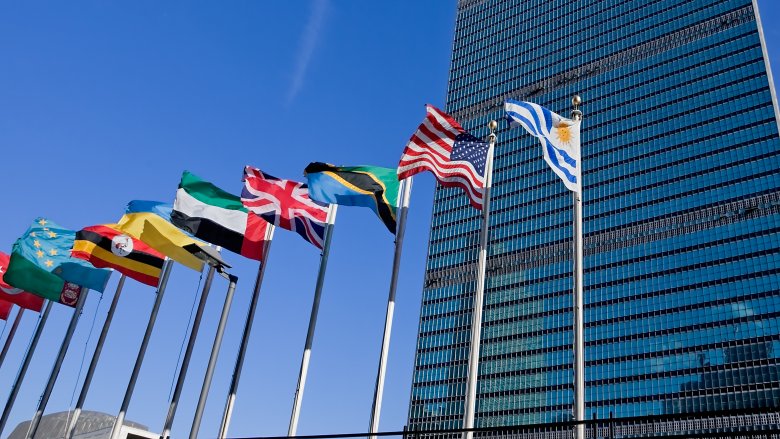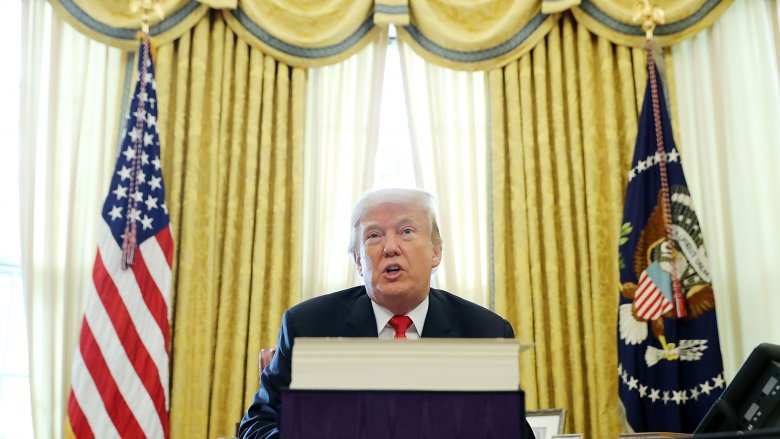The Real Reason Americans Are Having Fewer Babies
Birth rates in the United States hit a 30-year low in 2017. According to a report by the Centers for Disease Control and Prevention (CDC), births were down two percent from 2016 while the general fertility rate also dropped three percent. Additionally, the total fertility rate — which the CDC describes as "the level at which a given generation can exactly replace itself" has been following a downward trend since 1971. The evidence is irrefutable. Millennials — especially compared to their baby boomer parents — and other young adults simply aren't having many kids. But, why?
Instead of relying solely on statistical data to determine the cause, The New York Times polled real men and women via a survey conducted by Morning Consult — and the answers they gave were exhaustive. Here's what the 1,858 respondents, aged 20-45, said when asked why they expect, or have, fewer children than what they originally considered ideal.
Child care is ridiculously expensive
The largest share of participants — 64 percent — named the cost of child care as the reason for having fewer children. If you're wondering if it really is that expensive, it really, really is. The Care Index by New America and Care.com discovered that, on average, the cost of full-time child care in a child care setting for children aged four or younger is nearly $9,600 per year. For context, it would actually be cheaper to send your child to in-state college.
For a median income household, group child care represents about a fifth of money earned. However, for minimum wage earners, child care can cost a whopping two-thirds of their earnings. These costs only increase if you choose a nationally accredited center — or, if you opt to hire an in-home child care provider, like a nanny, the cost will nearly triple.
In states like Kentucky, Montana, Oregon, and Wisconsin, full-time childcare may just cost more than your rent. It makes sense why an overwhelming percentage of parents are forgoing having additional children.
Some Americans want more time for the kids they already have
If you've ever felt, or routinely feel, that you don't have enough hours in the day, you're far from alone. Fifty-four percent of people surveyed said they're choosing not to have another child because they want more time with the kids they already have. Interestingly, a report by Population Reference Bureau said American mothers and fathers spend just as much, if not more, hours caring for their children each week as did parents some four decades ago, which is often known as a family-centric era. Despite this fact, it's not uncommon for parents to fret about not having enough time to spend with their kids.
Authors Suzanne Bianchi, John Robinson and Melissa Milkie noted several reasons for these feelings in their book, Changing Rhythms of American Family Life. From overly-critical self-evaluations to sky-high cultural expectations, many parents can't win. Additionally, half of a parent's time these days is spent multitasking, double what it was in 1975. Is it any wonder so many American parents feel they need more time?
Mounting concerns over the economy
In 2007, the Great Recession hit, taking with it the life savings, jobs, and homes of millions of men and women throughout the United States. The longest economic decline since the Great Depression may have officially come to an end in 2009, but its aftereffects are still seen today. All things considered, 49 percent of young adults say they're too worried about the economy to have any more children.
"When the housing market fell, that really scared people," Michael Hurd, a senior researcher at Rand who studied the effects of the recession, told Time. Hurd discovered that people cut back on their spending after seeing a steep decrease in home values.
Tyler Cowen, professor of economics at George Mason University, said the effects of losing faith in the financial system will be long-lasting. "If you don't believe that your environment will persist, you're not willing to stake out plans," said Cowen. It certainly seems that that thinking has permeated American families when it comes to determining household sizes.
Americans simply can't afford more babies
It's not just remembering the past that has parents turned off from having more babies. Tyler Cowen told Time that, for many, money is still tight. In fact, household income, once adjusted for inflation, has plummeted an additional 4.7 percent since the recession.
With money fears also comes lovers' quarrels. A poll conducted by Time found that finances are not only the most common cause of arguments in relationships, but also are responsible for the most serious of disagreements. Of course, this isn't exactly conductive to, ahem, baby-making.
It's true that a second child, compared to firstborns, will generally not put as much strain on the wallet. However, another mouth to feed is, naturally, an added expense. And with so many Americans living paycheck to paycheck while simultaneously experiencing the aftershocks of the worst economic disaster in nearly 80 years, having another child just doesn't seem affordable for 44 percent of moms and dads surveyed.
Some waited for financial stability
Waiting to become financially stable before you have more children seems like a risk-free way to add to your brood. But what happens when that stability never comes or comes too late? Of the people polled by The New York Times, 43 percent said they decided to wait to have more children because of financial instability. This means these parents are now expecting to have, or already have, fewer kids than they'd first planned.
Contrary to what some might expect, these conditions aren't due to changing jobs, but are actually a result of changing income from within the same job. Since 1980, half of all Americans haven't seen an increase in wages, according to Harvard Business Review. Essentially, many people in the United States have steady jobs without the steady pay to match, due to what economist Jonathan Morduch and financial research center managing director Timothy Ogden dub "volatility and unpredictability" of both income and expenses. For many parents, that's not going to cut it.
Parents want more downtime over more babies
Ask any mom if she is tired and you'll likely hear an enthusiastic "YES" — well, as enthusiastic as a fatigued person can. Raising children often involves very little leisure time — at least in the United States, that is. Brigid Schulte, a journalist for the Washington Post and author of Overwhelmed: Work, Love, and Play When No One Has The Time informed the Huffington Post that Danish mothers have about one-and-a-half hours per day to spend sans kids. American mothers, on average, have just 36 minutes. How do they do it? For one thing, Danes work fewer hours per week than Americans, according to Schulte's book.
The desire for more leisure time inspired 43 percent of people to forgo expanding their family — but it may now also spur them to move to Denmark! Failing that, though, there are some things you can do here and now. Schulte said to first recognize the external pressures to over-work, over-do, and over-parent. "Take a breath. Work in pulses. Find a network of support," she added.
Many don't have enough or any paid family leave
The United States is the only developed country in the world that does not require employers to provide any paid family leave for new moms — none, zero, zilch. Meanwhile, our closest developed neighboring nation, Canada, allots mothers one year of paid time off to care for their babies. While that may sound like a dream to Americans, many countries provide even more. The United States, instead, mandates employers to supply up to 12 weeks unpaid time off through the federal Family and Medical Leave Act (FMLA).
Many of the Americans surveyed by The New York Times cited this policy as a reason for having fewer children. Not having any paid family leave factored into 38 percent of parents' decisions to eschew having more children and an additional 39 percent said that not enough paid family leave was a factor. There's no doubt about it: this is a huge issue facing parents — and would-be parents — in the United States.
Some fear global instability
Financial woes, economic concerns, and time constraints aside, there are plenty of parents — 37 percent of those polled — who are making the call to have fewer children because of their fears over global instability.
When you think of unstable countries, Egypt, Iraq, Argentina, or other places embroiled in severe civil unrest may come to mind. Comparing the United States to any such unstable nation would be a stretch, right? When CNN asked James Clapper, Director of National Intelligence about signs of instability within America, he replied, "I do worry." The U.S. Intelligence Community uses certain parameters to measure a nation's stability or, as the case may be, instability. Clapper admitted, "I guess if you apply that same measure against us, well, we are starting to exhibit some of them, too."
While Clapper isn't exactly saying you should run for the hills, it is startling to think of what could become a worldwide problem.
They struggle to form work-life balance
Striking a balance between work and all other aspects of life is a challenging task. Working mothers in America are no stranger to this concept, though finding a way to successfully accomplish it is another story altogether. Parents discovered that two-thirds of the working mothers they spoke with were also the ones doing most of the household management and child-rearing.
There's also pressure from schools to be actively — and constantly — involved. Manoush Zomorodi, a mother of two children under the age of 10 and host of WNYC radio's podcast Note to Self explained to the site, saying, "I just feel constant pressure from the school to the point that I feel like I'm always letting them down." She continued, "The same thing at work: Let's volunteer for Habitat for Humanity! Join the CEO for coffee and conversation! I would love to do all of these things, but, seriously, when do we have time to actually think?" You can just picture the 36 percent of Americans who cited a "struggle with work-life balance" nodding their heads. The struggle is most definitely real.
Concerned about domestic politics
In the 2016 presidential election year, more Americans were following domestic politics than they had in each of the three proceeding years. It makes sense, then, that more people would develop concerns. The year 2016 also saw a new record-high with 77 percent of Americans believing that the U.S. was divided on the most important issues, according to Gallup.
This concern over division and domestic politics as a whole even caused some women who were actively trying to have children to stop. "We had about a month of trying to get pregnant [in 2016]," 33-year-old Whitney told Vice, "When Trump got elected we both freaked out. We just lost our nerve."
Whether the concern is Trump or another factor of American politics, 36 percent of young adults surveyed for The New York Times didn't explicitly state. Nevertheless, they all cited being "worried about domestic politics" and thus are having fewer children.
Partner problems
It takes two to tango — wink, wink — so it adds up that issues with partners account for multiple reasons why some Americans have ended up with fewer children. Meeting a partner after it was too late was cited by 34 percent of those surveyed. It could be that these couples met near the end of the woman's childbearing years and, instead of having the three kids desired, perhaps there was only time for one.
Other adults — 22 percent — said they had fewer children than anticipated because they split up with their partner. With just about half of couples in the United States ending up divorced, this could be a reality for many.
An additional 19 percent of people surveyed admitted that it was their partner who was responsible for the couple having fewer children. Meaning that some partners simply don't want children. Sometimes this can be seen as a deal-breaker in a relationship, but, as this percentage proves, there's hope!
Climate change is too worrying
According to NASA, it's "extremely likely" that the global warming we're experiencing today is a direct result of "human activity." The earth, in a probable response to increased levels of greenhouse gases, is warming up. You don't need us to tell you that the polar ice caps are shrinking, natural disasters are increasing, and sea levels are rising.
In a situation for which we're mostly to blame, you can't help but want to do something to fix it — but how? Well one way, albeit one controversial way, is to have fewer children. "Certainly it's not my place as a scientist to dictate choices for other people. But I do think it is my place to do the analysis and report it fairly," Kimberly Nicholas, co-author of study on reducing climate change, said in an interview with NPR's Morning Edition. Through her work, Nicholas found that while eating a plant-based diet reduced CO2 emissions by less than one ton per year, having one fewer child in developed countries reduces emissions by over 58 metric tons.
Surely not everyone will subscribe to this plan, but fears about climate change have led 33 percent of Americans surveyed to this point.
Some Americans are taking care of too many people already
Are you part of the sandwich generation? If your day-to-day life calls for taking care of an aging parent while also raising children, you fit the bill. SheKnows explained that most Americans will end up becoming caregivers at one point in their lives or another. Still, for those sandwiched between the needs of their parents and their little ones all at the same time, it's even more exhausting.
"Women in the sandwich generation often try to do it all," Claudia Fine, a licensed clinical social worker and the executive vice president and chief professional officer at SeniorBridge, a geriatric care management company, told the site. Continuing, she said, "It's very difficult to juggle working, childcare, marriage and now parent care and impossible to do well." Women who inevitably aren't able to do each of these things perfectly then feel incompetent and, at times, even guilty. To the 29 percent of people already responsible for caring for other family members: we see you, we hear you.
They don't want to contribute to overpopulation
Overpopulation can be a pretty terrifying term when you think about it. Quite literally, it means that there's too many of us taking up space on this blue marble. Rightfully, it's a matter that freaks out a lot of people. As The New York Times' poll demonstrated, 27 percent of those surveyed have decided to have fewer children because of fears over population growth. So, this problem must be pretty epic, right?
David Satterthwaite, a senior fellow at the International Institute for Environment and Development in London told BBC, "It is not the number of people on the planet that is the issue — but the number of consumers and the scale and nature of their consumption."
Another fact of the matter is that population growth has been increasing so fast and unlike ever before. That means there's really nothing to compare it too. Can the planet sustain 11 billion souls? Some young adults aren't willing to roll the dice.
Some prioritized their educations and careers
"First comes love. Then comes marriage. Then comes a baby in a baby carriage," or so the old children's song goes. In a nuclear family, this tune may ring true, but, for most people, these life events can come in any combination — or not at all. Others would likely also inject more lines before getting to marriage and babies.
As more women pursue education and enter the workforce, the age in which women marry and start having children gets pushed back later and later, Stephanie Coontz, co-chair and Director of Research and Public Education for the Council on Contemporary Families, told Business Insider.
Moreover, if a woman has to make a choice between going after a career and having children, she is more likely to put off the latter than the former. This makes sense, then, why 23 percent of people polled cited the prioritization of education and career as the reason for having fewer children.
Some don't think they're good parents
Some men and women have decided to put off having children altogether because they're not sure if they'd be a good fit for parenting, others have decided to not add any more children to their family because they feel they're already doing a bad job. Despite being the smallest percentage in The New York Times' poll, 13 percent is still quite a lot of people who don't feel equipped to be parents. While every reason for having, not having, or having fewer children is valid, feeling like a bad parent is common and likely not true.
Dr. Seth J. Gillihan, a clinical assistant professor of psychology at the University of Pennsylvania wrote for Psychology Today: It's ironic how many of us think we're below average. ... Chances are you're doing a better job than you give yourself credit for." Parenting is also something that can always be improved and, as Gillihan writes, "Parent-child relationships are robustly resilient." We can all be thankful for that.
